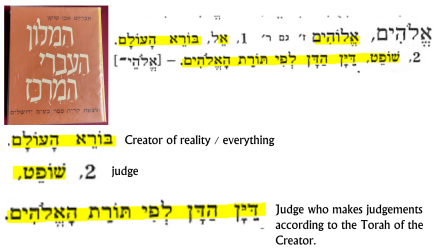Ehav4Ever
Well-Known Member
This thread will be used to discuss what ancient Israeli / Jewish sources state about the "term" (אלהים) "elohim" including its etymology, meaning, and uses in Jewish texts. Please be aware, this will be using actual source material and not sites like wikpedia and such that are not accurate in their interpretation of the data and often inserts modern English concepts into an ancient culture that is foreign to modern Western English culture. (Note: Hebrew is read from right to left)
So, though I have presented this before, the starting point is the etymology and definition of the word (אלהים) according to "Jewish and Samaritan Hebrew" sources as well as Akkadian / Mesopotamian sources. The reason is that these are the earliest sources for what the word meant for Ivrim / Yisraelim (Israelis) / Yehudim (Jews) in ancient times.
In the linqustic sphere all ancient Hebrew terms are derived from 3 letter roots known as a shoresh (a root). This means that all words that derive from a 3 letter root receives its meaning from the original three letter root. Modern Hebrew doesn't use this system anymore, even though the foundations of Modern Hebrew come from what was already established in ancient Hebrew.
That being said, the term el (אל) and the cognate (אלהים) are derived from the following three letter roots (א-י-ל) and (א-ו-ל).

According to the Etymological Dictionary of Biblical Hebrew: Based on the Commentaries of Rabbi Samson Raphael Hirsch Page 9 for the three letter root (א-י-ל).

Now using a modern Hebrew dictionary used in the modern time of Israel called Milon HaIvri Hamercaz by Avraham Even-Shushan we find the following:

Below the same dictionary describes that (אל) denotes power, strength, the ability to do, and also makes a linquistic connection with the term (אלהים).

Thus, the term (אלהים) does not mean "god" or "deity" on its own in "Jewish and Samaritan Hebrew." This also hold true in Summerian / Akkadian languages. The term could be used to describe what someone considers to be a "deity" to them BUT that is because in Hebrew they are claiming said diety has "power, the ability to do."
It is only in the process of English translation that the term was connected to the word "god" even though someone or something that is not "considered" a god or deity can correctly be called an elohim in ancient Hebrew, simply due to the perception of it having power.
With both the etyomology and the ancient / modern defintions of the words from Jewish and Samaritan standpoints, I will address how the word is used and whether when talking about Hashem it is plural or singular. I will also address the concept of what Jewish sources state toward whether or not elohim is actually a name.
So, though I have presented this before, the starting point is the etymology and definition of the word (אלהים) according to "Jewish and Samaritan Hebrew" sources as well as Akkadian / Mesopotamian sources. The reason is that these are the earliest sources for what the word meant for Ivrim / Yisraelim (Israelis) / Yehudim (Jews) in ancient times.
In the linqustic sphere all ancient Hebrew terms are derived from 3 letter roots known as a shoresh (a root). This means that all words that derive from a 3 letter root receives its meaning from the original three letter root. Modern Hebrew doesn't use this system anymore, even though the foundations of Modern Hebrew come from what was already established in ancient Hebrew.
That being said, the term el (אל) and the cognate (אלהים) are derived from the following three letter roots (א-י-ל) and (א-ו-ל).
According to the Etymological Dictionary of Biblical Hebrew: Based on the Commentaries of Rabbi Samson Raphael Hirsch Page 9 for the three letter root (א-י-ל).
Now using a modern Hebrew dictionary used in the modern time of Israel called Milon HaIvri Hamercaz by Avraham Even-Shushan we find the following:
Below the same dictionary describes that (אל) denotes power, strength, the ability to do, and also makes a linquistic connection with the term (אלהים).
Thus, the term (אלהים) does not mean "god" or "deity" on its own in "Jewish and Samaritan Hebrew." This also hold true in Summerian / Akkadian languages. The term could be used to describe what someone considers to be a "deity" to them BUT that is because in Hebrew they are claiming said diety has "power, the ability to do."
It is only in the process of English translation that the term was connected to the word "god" even though someone or something that is not "considered" a god or deity can correctly be called an elohim in ancient Hebrew, simply due to the perception of it having power.
With both the etyomology and the ancient / modern defintions of the words from Jewish and Samaritan standpoints, I will address how the word is used and whether when talking about Hashem it is plural or singular. I will also address the concept of what Jewish sources state toward whether or not elohim is actually a name.




